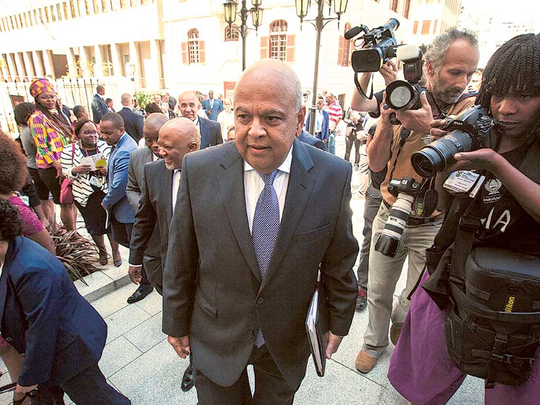
JOHANNESBURG: South African business leaders expressed their support on Monday for Finance Minister Pravin Gordhan as he faces a fraud trial that the opposition says is politically motivated.
The message of support, published in the Business Day newspaper, comes a day after Deputy President Cyril Ramaphosa - a possible future president - expressed concern about Gordhan’s prosecution and said the minister had his support.
The 15 business people, including former chief executives of Standard Bank and retailer Massmart, lauded Gordhan as an “outstanding” political leader.
“We have no doubt about the need for his critical leadership at this time of vital economic importance,” they said.
“South Africa’s democratic transformation cannot afford to have a man of Gordhan’s abilities distracted or sidelined.”
Prosecutors have ordered Gordhan to appear in court on November 2 to answer charges that he cost the tax department, that he used to head, 1.1 million rand (Dh281,858) by approving early retirement for a deputy commissioner and re-hiring him as a consultant.
Opposition parties and critics say the charges are part of a ploy to muzzle the Treasury, which has been critical of the political influence yielded by allies of President Jacob Zuma.
Investors are worried that Gordhan could be removed from his job, impeding efforts to kick-start the economy and raising the risk of a sovereign credit rating downgrade to junk status.
On Sunday, Gordhan revealed in a court affidavit distributed by the Treasury that 6.8 billion rand ($490 million) in payments made by wealthy brothers Ajay, Atul and Rajesh Gupta, companies they control, and other individuals with the same surname were reported to authorities as suspicious since 2012.
The three Indian-born businessmen are the subject of an official investigation into allegations that they have had undue influence over President Jacob Zuma. The payments in question, whose destinations were not disclosed in the document provided by Gordhan, were ascribed to the three brothers, their nephew Varun Gupta, numerous companies that they control as well as other individuals named as Chetali Gupta, Shivani Gupta and Arti Gupta. Reuters could not establish whether all these individuals were members of the same family.
Gordhan has for months been at odds with Zuma, not least over the alleged political influence of the Gupta brothers, but is looked to by edgy financial markets as a guarantor of stability.
Gordhan’s submission, dated October 13, is a request to the High Court in Pretoria for a declaratory judgment that he cannot interfere with decisions by South Africa’s major banks to cut their ties with businesses owned by the Gupta brothers.
Gordhan’s submission had the effect of airing what he considered to be evidence supporting his concerns about the Gupta brothers’ political influence.
The Gupta brothers are close to Zuma and the subject of a just-finished report by the outgoing Public Protector, a constitutionally-mandated anti-graft official, into allegations that they influenced the appointment of ministers. It was prevented from being made public on Friday by Zuma’s application to the High Court to delay its release.
Zuma has denied granting undue influence to the brothers and they have denied seeking it. Nevertheless, they said in August that they planned to exit all of their South African investments.
Several banks and companies have cut ties this year with the Gupta brothers’ investment vehicle, Oakbay Investments, without publicly disclosing their reasons. They included South Africa’s top four banks: Standard Bank, Nedbank, Barclays Africa’s Absa and First National Bank (FNB), part of FirstRand.












